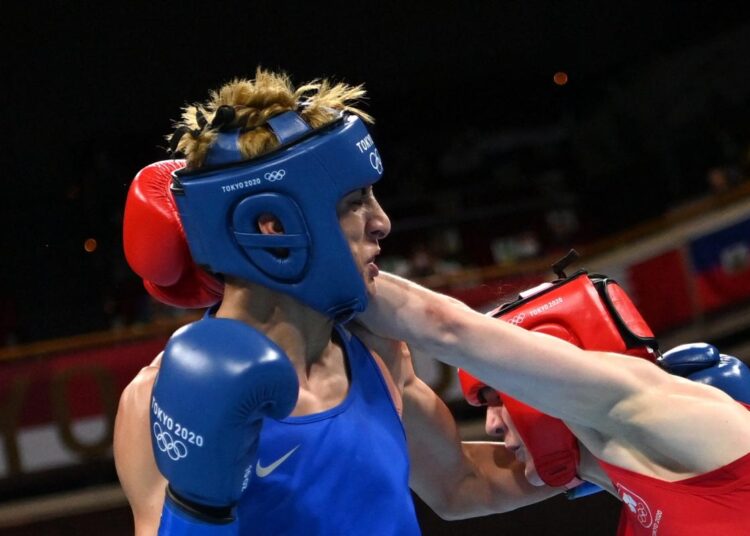PARIS – The case of two Olympic boxers has drawn attention to a thorny issue: Who and what determines which female athletes can compete.
Algerian boxer Imane Khelif and Lin Yu-ting of Taiwan both were disqualified from the 2023 women’s boxing world championships when they reportedly failed gender eligibility tests.
But this week, the International Olympic Committee confirmed the two boxers have been cleared to compete here at the Paris Games, as they both did at the Tokyo Games in 2021. The issues of so-called gender verification or sex testing have fueled discussion at the Olympics as the fighters prepare to enter the ring at North Paris Arena.
Khelif, a silver medalist at the 2022 world championships, is scheduled to fight Thursday against Angela Carini of Italy in the welterweight division at 146 pounds. Lin, a two-time world champion, is scheduled to fight Sitora Turdibekova of Uzbekistan in the featherweight division at 126 pounds.
“Yeah, it’s really tricky,” Australian boxer Tiana Echegaray told reporters Tuesday when asked about the situation. “I don’t know exactly what their circumstances are.”
IOC spokesman Mark Adams indicated Tuesday no personal information about the boxers’ medical histories would be disclosed. “They’ve been competing in boxing for a very long time,” Adams told reporters. “They’ve achieved all the eligibility requirements in terms of sex and age. We’re following the rules in place in Tokyo.”
Who’s in charge of boxing?
At the Summer Olympics, when it comes to gender eligibility, the IOC defers to the international federations that govern each of the 32 sports.
The IOC does provide a framework to the international federations. But it’s “nonbinding.”
In other words, it’s not up to the IOC. And the situation has grown especially complicated with boxing.
Last year the IOC banished the International Boxing Association (IBA), long plagued with scandal and controversy that jeopardized the future of Olympic boxing. In fact, the IOC denied IBA the right to run Olympic boxing during the Tokyo Games in 2021 and instead turned over control to an ad-hoc unit.
With that ad-hoc unit in charge, Kehlif and Lin both competed at the Tokyo Olympics. Neither won a medal.
But the IBA has maintained control of the world championships and gender eligibility rules. And after Lin won gold and Kehlif won bronze at the event in March 2023, officials announced the boxers had failed medical eligibility tests and stripped them of the medals.
IBA president Umar Kremlev said DNA tests “proved they had XY chromosomes and were thus excluded.”
What’s the eligibility criteria?
A passport could be key, based on comments from Adams, the IOC spokesman.
“I would just say that everyone competing in the women’s category is complying with the competition eligibility rules,” he said. “They are women in their passports and it is stated that is the case.”
Other eligibility standards have hinged on science.
Caster Semenya, a two-time Olympic gold medalist in track and field in 2012 and 2016, was forced to give up competing in the 400 meters because her testosterone levels were too high based on tests administered by World Athletics, the sport’s international federation previously known as the IAAF.
Semenya was assigned female at birth. She said she was told at age 18 that she has XY chromosomes and naturally had high levels of testosterone.
Khelif and Lin have not publicly addressed details of their medical histories regarding the tests.
The issue of eligibility surfaced as a source of controversy in the United States in 2022 when swimmer Lia Thomas became the first openly transgender athlete to win an NCAA championship.
At the time, the NCAA required transgender female athletes to have undergone one year of testosterone suppression treatment to be eligible to compete on a women’s team in any sport. The NCAA has been under pressure to update its guidelines after the NAIA banned all transgender athletes from competing in women’s sports.
The Court of Arbitration for Sport upheld a decision in June by World Aquatics, the international federation for swimming, that prevented Thomas from competing in elite competitions through World Aquatics or USA Swimming.
Who are these two boxers?
Lin, 28, has been fighting as an amateur for more than a decade, according to BoxRec, a widely regarded boxing site.
She made her official amateur debut about three months shy of her 18th birthday, winning at the 2013 AIBA World Women’s Championships. She won gold medals at the world championships in 2019 and 2022.
At 5-foot-9, she often has enjoyed a height advantage while amassing a record of 40-14 with one knockout. The record does not reflect the four fights she won at the 2023 world championships before her disqualification, which resulted in the outcome of the fights being changed to “no contest.’’
She lost her last fight – a split-decision defeat against Brazil’s Jucielen Cerqueira Romeu in April at the 2024 USA Boxing International Invitational in Pueblo, Colorado.
Khelif, 25, made her amateur debut at the 2018 Balkan Women’s Tournament. She won a silver medal at the 2022 world championships.
At 5-foot-10, she also has enjoyed a height advantage while amassing a record of 36-9 with four knockouts, according to BoxRec. That does not include the three fights she won at the 2023 world championships before her disqualification resulted in the fights being changed to “no contest.’’
In one of those fights, Khelif stopped her opponent by TKO.
Contributing: Kim Hjelmgaard
This article originally appeared on USA TODAY: Boxers bring issue of Olympics gender testing to surface
Read the full article here


























